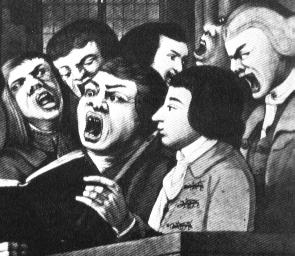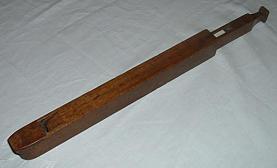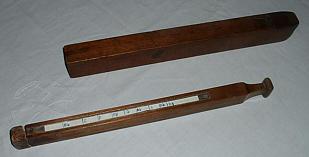|
A Tune Well Key'd In the early decades of the 18th century, psalmody in churches without an organ was usually led by the parish clerk, either lining out in the "old way" for the congregation to follow, or leading the choir of men and boys singing unaccompanied - the "new way". John Chetham in 1722 wrote "The TENOR is design'd for the leading part, and therefore must be pitched so that the Bass may perform the lowest Notes clear and strong, and the Treble the highest Notes without straining and squealing." (1) Temperley points out that for most of the 18th century "The fundamental medium of country psalmody was the unaccompanied choir, dominated by the tenor voice." (2) It was therefore critical that the parish clerk had a strong melodious voice AND the ability to set the pitch for the congregation or the choir to follow. Without another instrument, a pitch pipe was sometimes used but it is clear from references in the prefaces of some books of psalmody printed at this period that, in many places, the clerk set the pitch without one. William Tans'ur, writing in 1772 about the use of the pitch-pipe noted: "... it has been but little in Vogue with us, till within these thirty Years; for, I remember, I went several miles to see the first I heard of" . It was clear that even at that date a pipe was not widely used as he went on: "If you would key a Composition of various Parts for any Choir or Company of Singers, and have not a Pitch-Pipe, nor any Instrument depending; First, take a View thro' the whole Composition, and try if you can sound the highest Notes of the upper Parts above the Key Note, and also the lowest Notes of the Bass Bellow (sic); which if you can do without squeaking or grumbling and all other Voices perform clear and smooth; then may your Song be said to be pitch'd in a proper Key; for it is a general Maxim among Musicians, that, "A Tune well Key'd, is half sung:" (3) This is much the same as a "pitcher" at a shape note singing does today and a good one is a great asset. Perhaps not surprisingly, not all parish clerks had the skill of pitching accurately, leading to the musical part of the service being not as melodious as it might be. Tans'ur continued: "But Oh! how intolerable is some Psalmody performed in many Places, for want of Judgment in this Point!" whose Leaders are so stupidly conceited, as not to use a Pitch-Pipe! For it is daily found, by Experience, that Psalmody is very rarely well perform'd without it, unless by mere blind Chance; and on the contrary, very compleat, where they always make use of it, to use it with Judgment." William Riley described himself as the "Principal Teacher of Psalmody to the Charity-Schools in London, Westminster, and parts adjacent". Although his experience was principally of London churches, it is clear from his remarks that not all had organs and he strongly recommended that all parish clerks should have a pitch-pipe in their desk should the organ (or organist) not be available to support the singing. He observed: "But when a Tune is pitched at random by an unskilled Person, it is a very great Chance if he does not begin above, or below the proper Key, (for a Mistake of this Kind is sometimes committed even by a person whose Judgment in every other Respect might be depended upon ... ) by which means a Tune will generally be found to be out of the Compass of most Voices; and the People, rather than sing in pain, will sometimes leave off in the Middle of a Verse, and let the Clerk go through the Remainder as well as he can by himself, who, being out of Breath, and quite hoarse from straining, does it with great Difficulty, and is then obliged to start the next Verse even higher or lower, as the Case requires, and then perhaps is as much out of key as before." (4) One such clerk came to the attention of Thomas Moore through a friend who had suffered from the psalm being pitched too high one too many times and Moore wrote: "an old experienced practitioner of psalmody suddenly vent the Impatience and uneasiness of his mind, which was very much pained and put out of tune, as well as the organs of his voice, by a very remarkable instance of this kind, in the following petition to the clerk, who at the time it happened was the leader, or rather the misleader of the tune, by pitching it so monstrous high, that neither he nor any one else could possibly reach it, so as to make either Melody or Harmony of it." (5) Dear Chenaniah; pray forbear (*) Oft have I join'd in Songs like thine, Would'st thou but deign to sing thy Tunes But if thou are resolved still * Chenaniah was the leader of the Levites, the singers in the temple.  Fixed pitch pipe Early pitch-pipes gave only one note (from which the "pitcher" had to move up or down to find the correct pitch for a particular psalm (see picture). Later, the design was much improved by having a sliding plunger so that the length of the air column inside could be changed to give the desired note on the scale. Arnold noted that the pitch-pipe could be "had at any music shop in London for about 2s 6d each ... Having procured one of these instruments, you will find, marked in Pewter on the Register or Slider belonging to it, all the several Semitones included on an Octave." (pictures 2 & 3) It is worth mentioning his suggestion for the best way to arrange an unaccompanied choir in a church. "In standing in the church, which in most country churches is in the chancel, or in a Gallery or Singing Pew, let the bass Voices place themselves in a straight row with their backs next the congregation, then let the tenor voices place themselves in a straight row facing the Bass, but some distance off, the Contra Voices standing before the Bass, and the treble before the Tenor, facing the Contra. This being done your Harmony will go more pleasant and delightful, both to the Performer and Hearer; and every one may take part most easily when he sings alone, than he might when they stand one part mingled with another." Later compilers of psalmody stressed in their prefaces that their music was set at the correct pitch to avoid pitching problems and should be played in no other key. I have found records of expenditure in Kent churchwardens' accounts for the purchase of pitch-pipes after 1800 suggesting that singers in some (many?) churches may have sung unaccompanied well after this date, possibly until the introduction of an organ in the middle of the 19th century. These pitching problems were, it seems, often because parish clerks refused to change their "traditional" way of doing things. Riley noted that in the few churches in London without organs, clerks were still lining out the psalms in the old way and he claimed that this added to their problems. "The Reading of the Psalm Line by Line, is a very ancient practice, and has formerly been recommended by many Reverend Ministers, for the Benefit of the Illiterate; and it has been as much condemned by others, as a very absurd Custom, because it sometimes occasions the Clerk to lose not only the Key in which he is singing, but very often the Tune; for this is certainly the most difficult Part of a Clerk's Duty, as it requires a good Voice, and more Judgment than ordinary, two Requisites rarely to be found in one person." It was this refusal to change that moved Tans'ur to append the following ode to his comments about the pitch-pipe: This Instrument some Teachers do refuse, Such Paper-Skulls, much better had been mute, References: |

